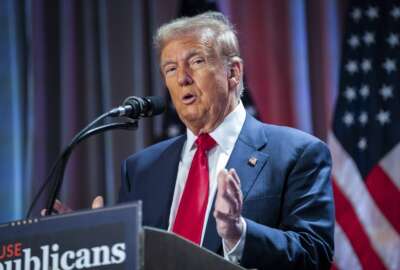Trump Cabinet confirmation hearings postponed over vetting delays
Trump’s transition team took longer than most incoming administrations to sign several key memos.
Senate committees are postponing confirmation hearings for several of President-elect Donald Trump’s Cabinet picks over delays in completing background checks and ethics reviews.
Senate VA Committee Chairman Jerry Moran (R-Kan.) said in a statement Monday that the committee will postpone its confirmation hearing for former Rep. Doug Collins (R-Ga.), Trump’s pick to run the Department of Veterans Affairs, because the FBI has not completed its background check on the nominee.
Moran said in a statement Monday that Collins “has submitted all his paperwork in a timely manner and has been transparent and forthcoming with the committee.”
“In accordance with long-standing practice, the committee should have an opportunity to review Congressman Collins’ FBI file before the confirmation hearing,” he added.
Fox News reported that Senate committees won’t schedule confirmation hearings for former Rep. Tulsi Gabbard (D-Hawaii), Trump’s pick for director of national intelligence, and Robert F. Kennedy, Jr., his pick to run the Department of Health and Human Services, until the FBI completes its background checks on the nominees.
The Senate Energy and Natural Resources Committee has also postponed its confirmation hearing for former Gov. Doug Burgum (R-N.D.), Trump’s pick to serve as Interior secretary, because the Office of Government Ethics has yet to complete its review of the nominee.
Committee Chairman Mike Lee (R-Utah) said in a statement that Burgum “has been fully cooperative throughout the confirmation process, promptly submitting his paperwork to the Office of Government Ethics.”
“Despite his compliance and the Energy and Natural Resources Committee noticing the hearing in accordance with all rules, OGE has yet to complete its review. This bureaucratic delay is unacceptable,” he added.
Max Stier, president and CEO of the Partnership for Public Service, told reporters on Monday that Senate committees typically don’t hold confirmation hearings before the FBI and OGE are done vetting nominees.
“The norm has always been to have a full field investigation from the FBI for the background check, and then certification from the Office of Government Ethics that the incoming nominee has actually got a plan to ensure that they will not have conflicts of interest,” Stier said. “That issue becomes all the more challenging when you’re dealing with people with large financial net worths, as well as complicated portfolios.”
Trump’s transition team took longer than most incoming administrations to sign several key memos.
The team signed a memorandum of understanding with the White House in late November that allowed landing teams to receive briefings from agencies. In December, the team signed another memo with the Justice Department that allows Trump’s top political appointees to go through the security clearance process.
“It clearly is slowing down, to some degree, the confirmation process. How much is still unclear, but it is having something of an impact,” Stier said.
Presidential campaigns typically complete these memos before the election, to ensure a seamless transition between the incoming and outgoing administrations.
The Trump team, however, never signed a memo with the General Services Administration that would have given officials access to office space, IT equipment and federal staff.
Trump transition officials, wary of interference from the outgoing Biden administration, said the team instead relied on private political donations to handle these logistics.
“The Trump team started very late in both respects, in terms of engaging the Office of Government Ethics, as well as the FBI. The real question is to whether or not the Senate will put all those nominees to the test, in terms of the information that they need,” Stier said.
About 4,000 political appointees join the federal workforce with each new presidential administration. About a third of them require Senate confirmation.
Valerie Smith Boyd, director of the Partnership’s Center for Presidential Transition, said the incoming Trump administration has scheduled Senate confirmation hearings at a pace on par with recent presidential transitions.
One month after the election, Trump announced 101 total appointments — about 2.7 appointments per day — about twice as fast as the average rate of the past three presidential transitions.
“The Senate has an important role in the Constitution to advise and consent on the president’s nominees, and we should all value the Senate’s role in this process because we benefit from attention and scrutiny around having the most capable individuals in agency leadership roles,” Smith Boyd said.
On average, the Senate confirmed the Biden administration’s nominees 21 days after their confirmation hearings. In the first Trump administration, those same nominees took 27 days to confirm.
Smith Boyd said the Partnership is calling on Congress to reduce the number of political appointees that require Senate confirmation. The Senate, she added, spends 59% of its votes on personnel-related matters.
“These delays in the process are bad for agencies dealing with vacancies. They’re bad for presidents trying to accomplish their priorities. They’re bad for attracting talented people to government jobs,” she said.
Stier said the Senate has a long-standing policy of requiring nominees to go through the OGE certification process before holding a confirmation hearing or vote, but added that “enforcement on this is not very good.”
“The OGE itself has very, very few people. And I think that the pressure being put on them is intensified, both because of the shortness of time that they’ve had to address the review of nominees, and equally important, the complexity of so many of them,” Stier said. “It would be a real problem if there was backsliding on the requirement that that exists before a hearing or vote could take place.”
It remains unclear how far along the Trump team is in vetting “Schedule C” political appointees that serve in confidential or policy roles, such as chiefs of staff or assistants to agency heads.
In 2016, the Trump administration had about 500 of these political appointees ready to go on Inauguration Day. In 2021, the Biden team had about 1,100 Schedule C appointees ready by the inauguration.
Smith Boyd said the incoming Trump team “has made signals that they would like to surpass that number,” but said delays in signing the MOU with the Justice Department may make it harder to get those appointees ready.
“We don’t really know yet how many of those people are ready to go,” she said.
Copyright © 2025 Federal News Network. All rights reserved. This website is not intended for users located within the European Economic Area.
Jory Heckman is a reporter at Federal News Network covering U.S. Postal Service, IRS, big data and technology issues.
Follow @jheckmanWFED
Related Stories






